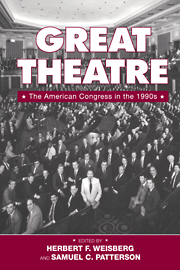Book contents
- Frontmatter
- Contents
- Figures and Tables
- Preface
- Contributors
- Introduction
- Congress and Its Audience
- 2 Representation in Congress: Line Drawing and Minorities
- 3 Unsympathetic Audience: Citizens' Evaluations of Congress
- 4 Back from Intermission: The 1994 Elections and the Return to Divided Government
- Congress at Play
- Congress and Other Actors
- Conclusion
- References
- Index
3 - Unsympathetic Audience: Citizens' Evaluations of Congress
Published online by Cambridge University Press: 20 January 2010
- Frontmatter
- Contents
- Figures and Tables
- Preface
- Contributors
- Introduction
- Congress and Its Audience
- 2 Representation in Congress: Line Drawing and Minorities
- 3 Unsympathetic Audience: Citizens' Evaluations of Congress
- 4 Back from Intermission: The 1994 Elections and the Return to Divided Government
- Congress at Play
- Congress and Other Actors
- Conclusion
- References
- Index
Summary
Today, many Americans think of “Congress as public enemy” – they are the notably unsympathetic audience for congressional politics (Hibbing and Theiss-Morse 1995). Much of the time, Americans' evaluations of Congress and its members are negative. Perhaps this is merely part and parcel of a more general suspicion about, and negativism toward, politics and politicians. But this is not the whole story. Americans are not simply negative about politics and government, or hostile toward Congress. In fact, citizens' attitudes about public affairs are ambivalent. On the one hand, Americans hold the constitutional system and governing institutions in high regard. They revere the Constitution, show patriotism and loyalty, and express admiration for the nation's basic institutional framework. On the other hand, though, Americans can express highly negative sentiments about “politicians,” about the governmental agencies of the moment, and about members of Congress in general. What factors help to account for the relative hostility of Americans toward members of Congress? In this chapter, we address this question by taking an approach rather different from that of previous students of the matter. We want to see whether or not evaluations of Congress are shaped by gaps between the expectations Americans have about members of Congress and their perceptions of the real-world representatives.
PUBLIC ATTITUDES TOWARD CONGRESS
This audience of citizens is interesting for various reasons. First, it has probably always been a relatively hostile audience and a difficult crowd to play before. In recent decades, public esteem for Congress, as it was denoted in citizens' evaluations of congressional job performance, had its ups and downs, reaching fairly high levels in the 1960s and then rapidly declining (Patterson and Caldeira 1990).
- Type
- Chapter
- Information
- Great TheatreThe American Congress in the 1990s, pp. 52 - 82Publisher: Cambridge University PressPrint publication year: 1998



